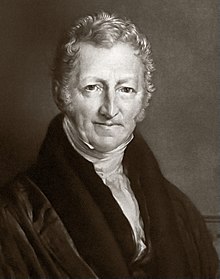馬爾薩斯主義


馬爾薩斯主義認為人口可能呈指數級增長,而食品供應或其他資源則呈線性增長,最終大量人口會因為糧食增長的速度跟不上人口增長的速度而死亡。這一情況被稱為馬爾薩斯災難(也稱為馬爾薩斯陷阱、人口陷阱、馬爾薩斯危機、馬爾薩斯幽靈),一旦農業生產跟不上人口增長,就會導致饑荒或戰爭,並且出現貧困和人口減少等情況。[1][2]
這些概念源自托馬斯·羅伯特·馬爾薩斯的政治和經濟思想,他在1798年的《人口論》中就提到了這些概念。馬爾薩斯認為,雖然技術進步以及豐富的資源可以增加食品供應,從而提高生活水平以及促進人口增長,不過最終因為人口增長使得人均獲得的資源又倒退到原來的水平。一些經濟學家認為,自工業革命以來,人類已經擺脫了馬爾薩斯陷阱。 [3][4]其他人則認為,極端貧困現象的存在表明馬爾薩斯陷阱這一理論依舊成立,[5]並且由於缺乏食物供應加上污染,開發中國家依然無法擺脫馬爾薩斯陷阱。 [6]
新馬爾薩斯主義
[編輯]新馬爾薩斯主義主張要實行人口規劃,以確保未來的資源可以跟得上人口發展的步伐。 [1]在英國,「馬爾薩斯主義」一詞也可以指代那些支持預防性節育的人和主張,因此有諸如馬爾薩斯聯盟之類的組織。[7]新馬爾薩斯主義者與馬爾薩斯理論的不同之處主要在於他們支持生育控制。虔誠的馬爾薩斯主義基督徒認為,「自我控制」(即禁慾)比人工節育更可取。新馬爾薩斯主義與18世紀的馬爾薩斯主義相衝突,新馬爾薩斯主義者認為,穩定增長的人口仍然是保持「社會進步」的必要因素,一般來說現代的新馬爾薩斯主義者通常比馬爾薩斯更關心人口過多導致的環境退化和災難性饑荒,而不是貧困。
批評
[編輯]馬爾薩斯主義受到了不同學派的批評,包括馬克思主義者[8]和社會主義者、[9]自由主義者和自由市場狂熱者、[10]女權主義者[11]和人權倡導者,他們認為這一主張過度悲觀並且不人道。[12] [13] [2][14]許多批評家認為,馬爾薩斯主義自《人口論》出版以來就已經名譽掃地。[15]不過也有許多支持者認為,人口增長最終仍然會導致資源緊缺,如果不採取行動遏制人口增長,人類未來仍有可能會面臨危機。[16][17]
參見
[編輯]參考文獻
[編輯]- ^ 1.0 1.1 Meredith Marsh, Peter S. Alagona (編). Barrons AP Human Geography 2008 Edition. Barron's Educational Series. 2008 [2022-03-26]. ISBN 978-0-7641-3817-1. (原始內容存檔於2020-10-16).
- ^ 2.0 2.1 Dolan, Brian. Malthus, Medicine & Morality: Malthusianism after 1798. Rodopi. 2000 [2022-03-26]. ISBN 978-90-420-0851-9. (原始內容存檔於2021-10-16).
- ^ Galor, Oded. https://ideas.repec.org/h/eee/grochp/1-04.html
|chapterurl=缺少標題 (幫助). Handbook of Economic Growth 1. Elsevier. 2005: 171–293 [2022-03-26]. (原始內容存檔於2022-03-25). - ^ Clark, Gregory. A Farewell to Alms: A Brief Economic History of the World. Princeton University Press. 2007. ISBN 978-0-691-12135-2.
- ^ Julia Zinkina & 安德烈·科羅塔耶夫. Explosive Population Growth in Tropical Africa: Crucial Omission in Development Forecasts (Emerging Risks and Way Out). World Futures 70/2 (2014): 120–39 (頁面存檔備份,存於網際網路檔案館).
- ^ Tisdell, Clem. The Malthusian Trap and Development in Pre-Industrial Societies: A View Differing from the Standard One (PDF). University of Queensland. 1 January 2015 [26 February 2017]. (原始內容存檔 (PDF)於2021-07-14).
- ^ Hall, Lesley. https://books.google.com/books?id=2znzI0_nzXcC&pg=PA141
|chapterurl=缺少標題 (幫助). Malthus, Medicine, & Morality. Clio Medica (Amsterdam, Netherlands) 59 (Dolan (2000), Malthus, Medicine & Morality: Malthusianism after 1798, p. 141: Rodopi). 2000: 141–163 [2022-03-26]. ISBN 978-9042008519. PMID 11027073. doi:10.1163/9789004333338_008. (原始內容存檔於2021-10-16). - ^ See, for example, Ronald L. Meek (編). Marx and Engels on the Population Bomb. The Ramparts Press. 1973. (原始內容存檔於2000-05-21).
- ^ Barry Commoner. A Bulletin Dialogue: on "The Closing Circle" – Response. Bulletin of the Atomic Scientists. May 1972: 17–56 [2022-03-26]. (原始內容存檔於2022-01-10).
- ^ Simon, JL. Resources, Population, Environment: An Oversupply of False Bad News. Science. June 27, 1980, 208 (4451): 1431–37. Bibcode:1980Sci...208.1431S. JSTOR 1684670. PMID 7384784. doi:10.1126/science.7384784.
- ^ Knudsen, Lara Reproductive Rights in a Global Context: South Africa, Uganda, Peru, Denmark, United States, Vietnam, Jordan, Vanderbilt University Press, 2006, pp. 2–4. ISBN 0-8265-1528-2, ISBN 978-0-8265-1528-5.
- ^ Kunstler, James Howard. The Long Emergency. Grove Press. 2005: 6 [2022-03-26]. ISBN 978-0-8021-4249-8. (原始內容存檔於2022-03-26).
- ^ Serge Luryi. Physics, Philosophy, and ... Ecology (PDF). Physics Today. May 2006, 59 (5): 51. doi:10.1063/1.2216962. (原始內容 (PDF)存檔於July 21, 2011).
- ^ Frank W. Elwell. Reclaiming Malthus, Keynote address to the Annual Meeting of the Anthropologists and Sociologist of Kentucky. 2001 [2011-04-19]. (原始內容存檔於2017-03-24).
- ^ Bjørn Lomborg. The Skeptical Environmentalist: Measuring the Real State of the World. Cambridge University Press. 2002: 30. ISBN 978-0-521-01068-9.
- ^ Colin Fraser. Green revolution could still blow up in our face. The Age. February 3, 2008 [2022-03-26]. (原始內容存檔於2011-06-28).
- ^ Cristina Luiggi. Still Ticking. The Scientist. 2010, 24 (12): 26. (原始內容存檔於January 1, 2011).
延伸閱讀
[編輯]- (簡體中文)從馬爾薩斯陷阱談起
- (簡體中文)馬爾薩斯困境、薩繆爾森寓言和中國內需之殤
- (簡體中文)非洲人口:是奇蹟還是馬爾薩斯災難? (頁面存檔備份,存於網際網路檔案館)
